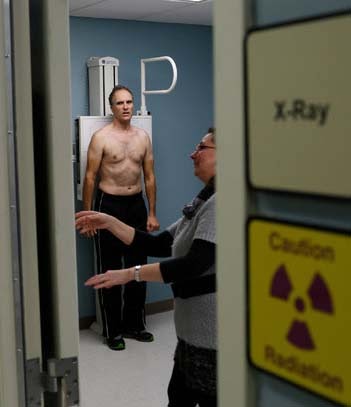Primary care, a big focus of health reform, faces challenges as Kentucky doctors deal with change

 |
| Craig Dooley, newly covered by Medicaid under health reform, got an X-ray in Dr. Sven Jonsson’s Baptist Health office. (Photo by Luke Sharrett for The New York Times) |
Primary-care doctors are key to the nation’s health by providing preventive care to people who haven’t been getting it but are now under federal health reform. However, some independent physicians in Kentucky and other states are struggling to run their businesses due to “flat or dropping reimbursement rates and new federal rules,” many related to reform, Abby Goodnough writes for The New York Times. Goodnough’s story is the latest in a series lookine at health reform through Kentucky examples.
Dr. Sven Jonsson joined Kentucky’s Baptist Health System two years ago after leaving private practice in Louisville, fearing the law’s often-expensive requirements. Now he is treating more patients, in the rural exurb of Taylorsville, and Baptist is handling all the details of the transition into the new health-care system. “This is just a much saner place for me right now,” he said. Primary care is more in demand because many states used it to expand Medicaid to people earning up to 138 percent of the poverty line.
Conversely, Dr. Tracy Ragland owns a small private practice in the wealthy suburb of Crestwood, and is concerned about the rules and payments associated with the new system. “The possibility of not being able to survive in a private practice, especially primary care, is very real,” she said.
According to the American Medical Association, 40 percent of family doctors and pediatricians are independent. Ragland supports the idea of providing health coverage to more Americans, but says Medicaid and some private plans offered through Kentucky’s health-insurance exchange don’t pay enough, so she does not treat those patients. She says she values the flexibility of her private practice and the ability to spend as much time with patients as they need.
However, Ragland did join an “accountable care organization,” a group of independent physicians who arrange care for a number of patients. “These networks, encouraged by the new law, reap financial rewards if they improve patients’ health and spend less doing it,” Goodnough notes. Ragland and her associates know that primary-care doctors can receive higher, Medicare-level reimbursements for seeing Medicaid patients, but this only lasts through 2014 and they didn’t take the bait.
Doctors who have joined hospitals, like Jonsson, receive a baseline salary with bonuses for extra productivity, but that will probably change because the reform law will base payments on results. When Jonsson owned his own practice, he didn’t accept Medicaid. At his new workplace at Baptist Medical Associates, he can treat Medicaid patients because the practice has space to grow, said Donna Ghobadi, an assistant vice president at the hospital.
Recently Kentucky passed a bill that will “give experienced nurse practitioners more leeway to practice independently,” Goodnough reports. Ragland went to the state Capitol to ask legislators to give scholarships to medical and nursing students who will practice in under-served areas. “I don’t get the emphasis on primary care is so important, but primary care physicians aren’t,” she said. Lawmakers said they will consider her ideas next year. (Read more)
Here’s a video version of Goodnough’s story: